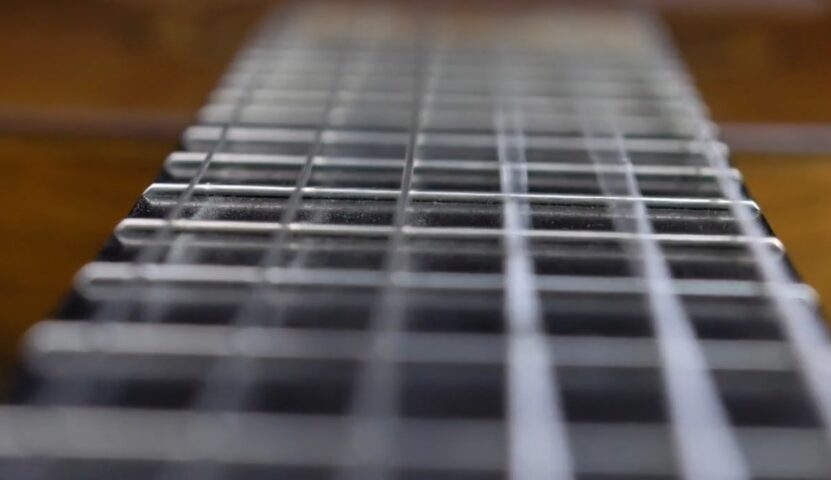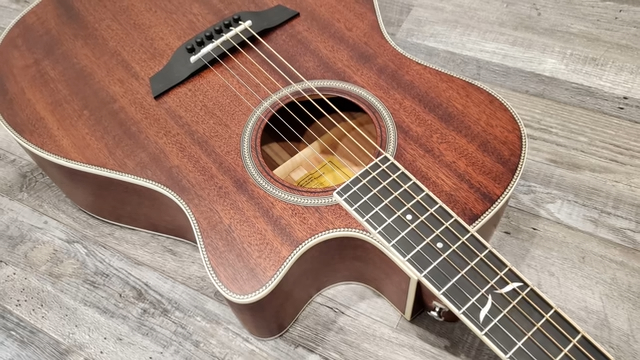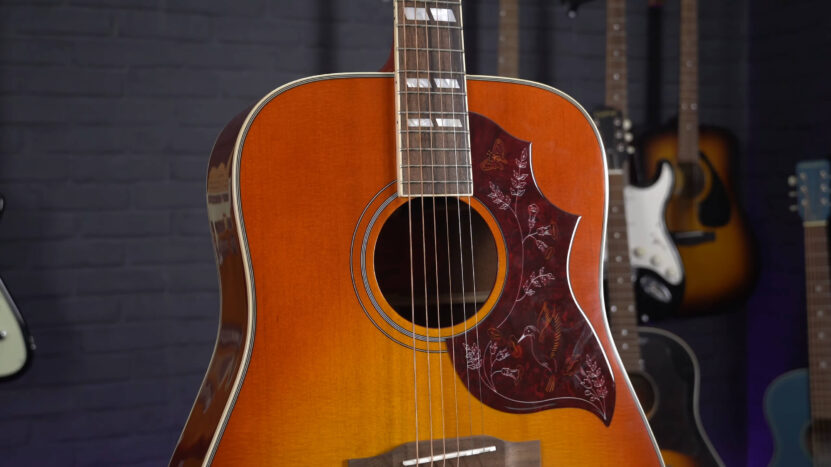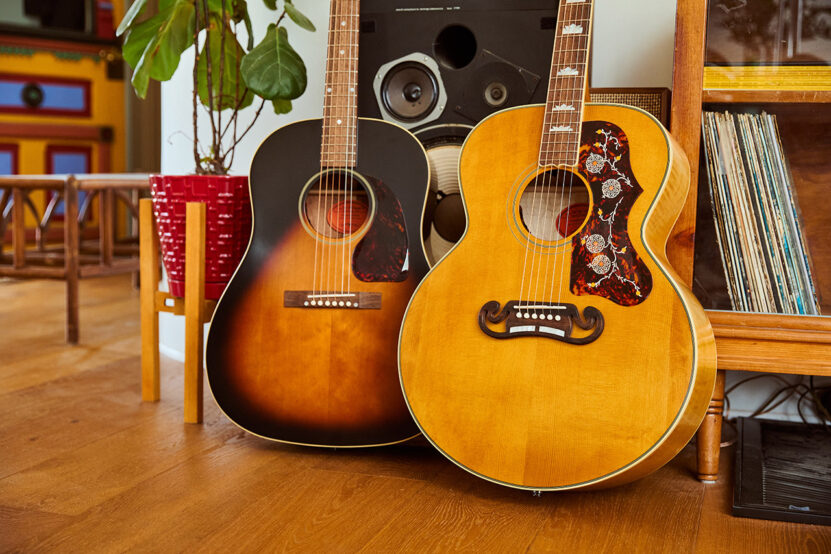
Share Post:
As a guitarist, few things are as satisfying as the bright, resonant sound of fresh strings on your guitar. But over time, the sparkle fades, the tuning starts to slip, and you know it’s time to make a change.
Let’s chat about why guitar strings age, how to know when they’ve run their course, and how to keep your strings – and your sound – in top shape.
Why Guitar Strings Age

Guitar strings might seem pretty tough, but they’re vulnerable to the same forces that affect just about anything exposed to the elements: time, wear, and the environment.
Let’s break it down.
Material Degradation
Most guitar strings are made of metal alloys, which unfortunately means they’re susceptible to rust, especially when exposed to air and moisture. Even if you’re not playing much, humidity in the air can cause oxidation, leading to rusty patches. Well-maintained strings are a must when practicing new chord shapes for the best learning experience.
You might not notice it right away, but this rust dulls your sound and makes strings rougher to play. Then there’s the sweat and oils from your fingers. Every time you play, those natural oils and acids from your skin latch onto the strings, speeding up the corrosion process.
It’s a double whammy – mechanical wear from pressing on the frets combined with chemical wear from your skin’s oils. Over time, this combo wears down the strings, leaving flat spots on the wound ones and leading to tuning issues.
Loss of Tone
Remember the crisp, bright tone of brand-new strings? It’s one of the joys of restringing your guitar. But as strings age, they lose that brightness. Dirt, sweat, and grime gradually build up, muffling the tone and reducing the strings’ ability to sustain notes.
Especially in wound strings, all that gunk gets into the windings, killing the sustain and making your guitar sound flat and lifeless.
Tuning Stability
Ever find your guitar slipping out of tune more easily than usual? Aging strings could be the culprit. Strings naturally stretch over time, which affects their tension and makes them harder to keep in tune.
They might also start feeling slack, making it tougher to achieve the precise tuning that keeps your playing in harmony.
Physical Condition
Beyond the sound, you can often tell just by looking at your strings that they’re past their prime. Rust spots or tarnish, and even brittleness are tell-tale signs.
Those spots can make your strings feel rough under your fingers, not to mention increase the risk of breakage, especially when tuning up or playing with a bit more force. Once strings get to this point, playing becomes less enjoyable – and a lot more frustrating.
When to Change Your Guitar Strings

Knowing when to swap out your strings is key to keeping your guitar sounding and playing its best. But how often should you be changing them? It depends on a few factors, like how often you play and the environment your guitar lives in.
How Often Do You Play?
- Frequent Players: If you’re playing daily or even for a few hours each week, you’ll notice your strings start to wear out more quickly. In this case, changing strings every few weeks to a month is a good rule of thumb. Regular playing means regular wear, so your strings will need more frequent replacement to keep that fresh sound.
- Occasional Players: If your guitar playing is more of a now-and-then hobby, your strings might last a bit longer. Changing them every three months could be enough. But if you’re pulling out the guitar for an occasional jam session, consider how long you’re playing each time and how you’re storing your guitar. Even with less frequent use, the environment can still take its toll.
Where’s Your Guitar Stored?
- High Humidity: Living in a humid area? Your strings will age faster, even if you’re not playing as much. Moisture in the air speeds up rust and corrosion, meaning you might need to change your strings more often to keep your sound clean and bright.
- Low Humidity: While dry environments might slow down oxidation, they can create other issues, like brittleness. In very dry conditions, your strings might last longer before showing visible signs of rust but could snap unexpectedly due to the lack of moisture. It’s a tricky balance.
Are You Recording or Performing?
If you’re gearing up for a recording session or a live gig, fresh strings are a must. The last thing you want is a dull tone or tuning issues messing up your sound.
Many pros change their strings right before a performance or recording to ensure everything sounds as good as possible. Even if you like the sound of broken-in strings, fresh ones will give you the reliability you need on stage or in the studio.
Signs It’s Time to Change Your Strings

There are some clear indicators that it’s time to change your strings, even if you’re not sticking to a strict schedule. Listen to your guitar – it’s telling you something!
- Dull Sound: When your guitar starts losing that vibrant, resonant tone and starts sounding muted or flat, your strings have likely seen better days.
- Difficulty Tuning: If you’re constantly retuning because the strings just won’t hold their pitch, they’ve probably stretched to the point where they’re no longer stable.
- Visible Wear: Rust, tarnish, and flat spots on the strings are surefire signs it’s time for a change. Not only do they affect sound quality, but they also increase the risk of breakage.
- Rough Feel: If your strings feel gritty or rough under your fingers, they’ve accumulated too much dirt and corrosion. This makes them uncomfortable to play and affects your guitar’s tone.
Tips to Make Your Strings Last Longer
Keeping your strings in good condition can help you get the most life out of them. A few simple habits can go a long way.
- Wipe Down After Playing: Get into the habit of wiping down your strings with a clean, dry cloth after each session. Removing sweat, oils, and dirt can slow down the aging process and keep your strings sounding fresh.
- Use String Conditioners: There are plenty of products out there designed to protect your strings from corrosion and wear. String conditioners can add a layer of protection, helping extend the life of your strings.
- Store Your Guitar Properly: When you’re not playing, store your guitar in a case, ideally in a climate-controlled environment. Avoid areas with high humidity or extreme dryness, which can both speed up string degradation.
- Try Coated Strings: Coated strings come with a thin polymer layer that protects against corrosion. They’re more expensive than regular strings but can last significantly longer, making them a good option if you want to cut down on string changes.
Wrapping Up
Guitar strings are more than just a necessary component; they’re the lifeblood of your sound. By paying attention to how they age and knowing when to change them, you can keep your guitar playing and sounding its best.
Regular maintenance, a little TLC, and being aware of the signs that your strings need replacing can make a world of difference in your playing experience.
So, next time you notice your tone dulling or your tuning slipping, don’t hesitate – grab a fresh set of strings and get back to making music that sounds as good as it feels.
Related Posts:
- Can You Tell the Difference Between AI Composed…
- 7 Essential Guitar Chord Shapes Every Beginner Should Know
- Top 10 A7 Chord Variations Every Guitarist Should Know
- How Can You Skip Songs with AirPods Pro? - Here’s…
- What Does “Skip to My Lou” Mean? - You'll Be Surprised!
- What Is Acoustic Guitar Scale Length and Why Does It Matter?











